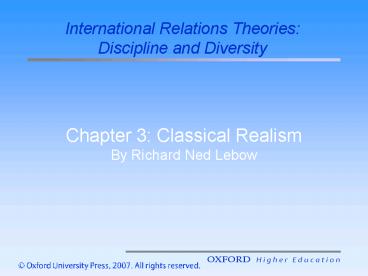Chapter 3: Classical Realism By Richard Ned Lebow
1 / 11
Title:
Chapter 3: Classical Realism By Richard Ned Lebow
Description:
... it as an effective deterrent of war but rather as a potential cause of conflict ... At the end of the Cold War US moved towards unilateralism. ... –
Number of Views:2412
Avg rating:3.0/5.0
Title: Chapter 3: Classical Realism By Richard Ned Lebow
1
Chapter 3 Classical RealismBy Richard Ned Lebow
International Relations Theories Discipline and
Diversity
2
Learning objectives
- After this lecture you should be able to
- Appreciate the key principles and themes of
classical realism - Understand the main differences between
classical realism and neorealism - Apply classical realist themes to
contemporary world politics
3
Problems of neorealism
- Classical realism considers neorealism a parody
of science it is overly parsimonious,
unfalsifiable and does not adequately theorise
key concepts such as polarity and power - The decline of neorealism since the end of the
Cold War has resulted in renewed interest in
classical realist thinkers.
4
Key classical realists
- Key classical realists include
- Thucydides, Machiavelli, Von Clausewitz,
Morgenthau - They have been interested in questions of order,
justice and change across 2500 years - They tend to
- advocate holistic understanding of politics
- recognise the close relationship of domestic and
international - acknowledge the role of ethics and community
- regard history as cyclical
5
Domestic and international
- Classical realists do not make a strong
distinction between domestic politics and the
anarchical realm of world politics - They see the cohesiveness of community and shared
norms as central in maintenance of order and
restraint in international relations as in
domestic politics
6
Balance of power
- Classical realists appreciate the importance of
balance of power in international relations.
However, they do not see it as an effective
deterrent of war but rather as a potential cause
of conflict - Order ultimately rests on strength of community
for classical realists. - For example, for Morgenthau it was norms of
international society rather than the
distribution of capabilities that maintained the
effectiveness of balance of power in Europe
during the 18th and 19th centuries
7
Interests and justice
- Neorealists emphasise interests as the priority
of state goals. Classical realists emphasise
justice as the foundation of community and order - For classical realists justice is important for
two reasons - 1) Because it is the key to influence
- 2) Because it provides the basis on which actors
construct their interests
8
Change and modernisation
- For classical realists, change is associated with
modernisation, which brings about shifts in
identities and discourses, and hence conceptions
of security - In restoring order both Thucydides and Morgenthau
looked for a combination of old and new to
accommodate changes while limiting their
destructive potential
9
Theory
- Classical realists conception of theory is
distinct from contemporary realism - Thucydides emphasised the context dependence of
foreign policy actions - Morgenthau also denied general laws and
predictions
10
Case study Iraq
- Iraq war can be seen from a classical realist
perspective as a tragedy in the Greek sense - At the end of the Cold War US moved towards
unilateralism. Intoxication with power led the
Bush Administration to hubris - This can be seen in the case of Iraq the
operation in Iraq was poorly prepared and relied
on hope more than reason - The failure of the Iraq operation reminds us that
great powers are their own worst enemy
11
Conclusion
- The notion of tragedy captures the contradiction
between the ability of man and his propensity to
destroy with violence what has been achieved - Classical realists were pessimistic of the
ability of the powerful to exercise
self-restraint but a key theme of classical
realism is that it offers prudence as an antidote
to hubris































